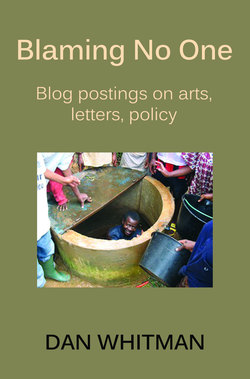Читать книгу Blaming No One - Dan Inc. Whitman - Страница 16
На сайте Литреса книга снята с продажи.
If Music Be the Food June 5, 2011
ОглавлениеEveryone needs music; no one knows exactly why. There’s nothing “universal” about any particular form of it, but people seem to need reminders of their own heartbeat. “Syncopation” of course comes from “syncope,” a single, irregular heartbeat sometimes resulting in fainting. Most music has syncopation sooner or later, the point being, I guess, that you can lose the heartbeat for a moment and then get it back. It’s reassuring.
In about 1972 I went to Apple Hill, in New Hampshire. I was only visiting. The youngsters there had extraordinary talent, and raised the rafters of a barn with some Haydn and Mendelssohn.
Apple Hill now draws more oldsters than youngsters. In fact, country-wide, there is something happening with sixty-somethings who attend summer music retreats to have another chance at playing well. If they’d been playing at Apple Hill in 1972, they wouldn’t be back again now. But there are thousands, maybe more, who show up in the summer, get their name tags, and go to work. They play hard and aim high. They’re forgiving of one another’s inadequacies, since that’s the social glue that makes the process possible.
An amateur is a musician in search of a miracle. Amateurs can achieve miracles for fleeting moments, but aren’t usually able to sustain them. If they did, they’d be called “professionals.” The fleeting moments are what amateurs live for, their motive for displacement, putting up with communal living and food, and getting corrective advice from maddeningly young and talented coaches. The coaches are heroes. I never met one who was sadistic, or revealed annoyance at hearing screw-ups on the instruments of their expansive souls’ yearnings.
I’ve been to summer music up and down the East Coast. At the end of each of them I say, “No more of this,” but then I go back for more. Triumph of hope over experience? It’s something we do almost clandestinely, since failure dogs us as the unwanted companion. The mind and heart have their music which the fingers know not.
Something happens as people get together with strangers with a common objective. Forgiveness, I’ve said, is a part of it. More compelling is the bridge spanning chasms of difference. You can find yourself in a quartet with people with almost nothing in common, but for the single overlapping interest of making music with others. Social phenomena happen, with conversations off the deep end of one’s own experience and interests, but with the link of the one interest everyone shares. A contractor, a physicist, a poet, a street person, a teacher can find surprising connections, and might all know the same Villa-Lobos quartet to their surprise. At a recent introductory session, the retired physicist said, “I have a PhD in mathematics but I never learned to count.” Good one.
It’s like sitting with a stranger on a bus or train. You might talk about things you’d never mention to someone you knew you’d see again for sure.
Now is summer migration season. The last retreat I attended was probably the best, set in idyllic surroundings, the innkeepers supportive and inquisitive. Even the food sustained. Usually the food is the first sacrifice one makes in going to these things, but not this last time.
People got along. A young man with marital issues received attention and free advice from people who’d been through these things themselves. The music itself – well let’s not dwell too much on that. The teachers know how to make things better without leading people off the cliff of unreasonable expectations.
A common theme at music retreats is reincarnation. “In my next lifetime I’ll just do violin.” “I’ll be a clarinetist next time.” “I’m coming back as a quartet.” These become commonplace.
Everyone wants a second chance, either to redo a fudged passage, or a life that could have been lived through different options. I don’t hear much discussion of this, but it’s a big societal event in a country with lengthening life spans and a belief—despite evidence—in better times ahead.
